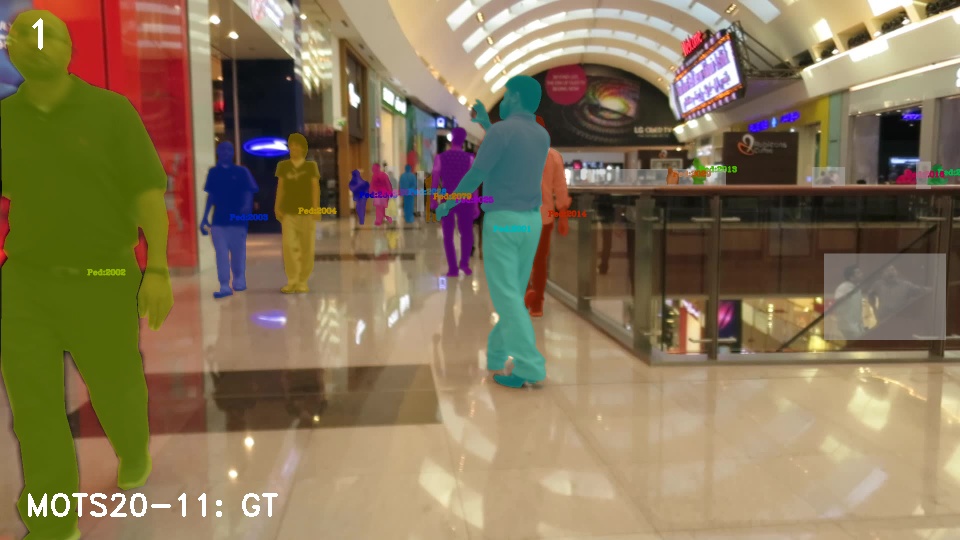- Python 3.6.9
- install requirements.txt
- Run
python MOTS/evalMOTS.py
To run the evaluation for your method please adjust the file MOTS/evalMOTS.py using the following arguments:
benchmark_name: Name of the benchmark, e.g. MOTS
gt_dir: Directory containing ground truth files in <gt_dir>/<sequence>/gt/gt.txt
res_dir: The folder containing the tracking results. Each one should be saved in a separate .txt file with the name of the respective sequence (see ./res/data)
save_pkl: path to output directory for final results (pickle) (default: False)
eval_mode: Mode of evaluation out of ["train", "test", "all"] (default : "train")
eval.run(
benchmark_name = benchmark_name,
seq_file = seq_file,
gt_dir = gt_dir,
res_dir = res_dir
)
To visualize your results or the annotations run
python MOTS/MOTSVisualization.py
Inside the script adjust the following values for the MOTSVisualizer class:
seqName: Name of the sequence
FilePath: Data file
image_dir: Directory containing images
mode: Video mode. Options: None for method results, raw for data video only, and gt for annotations
output_dir: Directory for created video and thumbnail images
Additionally, adjust the following values for the generateVideo function:
displayTime: If true, display frame number (default false)
displayName: Name of the method
showOccluder: If true, show occluder of gt data
fps: Frame rate
visualizer = MOTSVisualizer(seqName, FilePath, image_dir, mode, output_dir )
visualizer.generateVideo(displayTime, displayName, showOccluder, fps )
Each line of an annotation txt file is structured like this (where rle means run-length encoding from COCO):
time_frame id class_id img_height img_width rle
An example line from a txt file:
52 1005 1 375 1242 WSV:2d;1O10000O10000O1O100O100O1O100O1000000000000000O100O102N5K00O1O1N2O110OO2O001O1NTga3
Meaning:
time frame 52
object id 1005 (meaning class id is 1, i.e. car and instance id is 5)
class id 1
image height 375
image width 1242
rle WSV:2d;1O10000O10000O1O100O100O1O100O1000000000000000O100O...1O1N
image height, image width, and rle can be used together to decode a mask using cocotools.
If you work with the code and the benchmark, please cite:
@inproceedings{Voigtlaender19CVPR_MOTS,
author = {Paul Voigtlaender and Michael Krause and Aljo\u{s}a O\u{s}ep and Jonathon Luiten and Berin Balachandar Gnana Sekar and Andreas Geiger and Bastian Leibe},
title = {{MOTS}: Multi-Object Tracking and Segmentation},
booktitle = {CVPR},
year = {2019},
}
MIT License
If you find a problem in the code, please open an issue.
For general questions, please contact Paul Voigtlaender (voigtlaender@vision.rwth-aachen.de) or Michael Krause (michael.krause@rwth-aachen.de)
